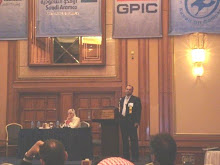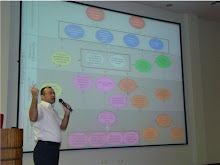Once an organization structure is decided and established, the lines of authority can be drawn. But the interaction between organizational components, the shift in strategy along the way, and specific projects’ conditions would lead to continuous changes.
This is why two project managers, responsible for similar projects may have different authorities. And the same applies to functional divisions.
Estimating project managers may have more power, resources, and decision-making authority than some project managers these days… what? You may say… but yes, this is where a bottleneck may be today.
If we start with the organizational structure, matrix/functional etc…Having an established PMO or not, the culture of organizational members, their attitude towards power, and the complexity of projects, are all factors to consider when deciding on the level of authority ‘our project managers’ should be allowed to exercise.
Yes, I think that power should be ‘allowed’ and not given. We give an acceptable limit and different managers choose levels within these limits. PMO can close gaps by either supporting PMs or relocating them.
Our construction projects are huge. That is where other aspects of Project Manager’s power become of vital importance: Expert, Delegation, Referral, Coaching and the like. In our case, these sometimes prevail over the power ‘given’ by the PMO. Because, to manage complex projects, leadership becomes preferable over formal power. A ‘prisoner’s dilemma’ would cost a fortune.
Another aspect of looking into power is by looking at how much to “control”. I think that the PMO Heads/Strategic Decision makers /Executives can set high leverage points. Middle Management would draw more defined power control limits depending on specific situational conditions (as explained earlier). Their primary focus would be the strategic objectives and accordingly give more power in places that serve best. While on the lower level, Project Managers will be managing the implementation tools (Projects).
About The Author

- Eng. Samer el Barakeh, MPM, PMP
- Samer el Barakeh was born in Lebanon, 1973. He completed his Bachelor in Engineering-CCE at Beirut Arab University-Lebanon in 1996 with honours. Samer was granted Masters Degree in Project Management (MPM) from the University of Sydney-Australia with honours. He also gained the Project Management Professional (PMP) Credential from The Project Management Institute (PMI). Samer is a member of the Order of Architects and Engineers in Lebanon since 1996, The Project Management Institute (PMI), Arabian Gulf Chapter (AGC-PMI) and Lebanon Chapter-PMI. During his 13 years of professional experience in Lebanon, Australia and Saudi Arabia, Samer held many positions among them: Telecommunication Site Engineer, Site Manager, Low Current Service Head, and he is currently Senior Systems Analyst at the General Project Construction Division. Samer is a Project Management Consultant and Training Provider for universal organizations like Business Management Consultants (USA) www.bmc-online.com and PMCTQuest (Canada) www.pmctquest.com Samer is a Registered Training Provider for Project Management Professional (PMP), and he provides training in Program Management, Portfolio Management,PMO...
Select a topic to view content
- A comparison between PMBOK and Prince2 Methodologies and reflection on case study examples (1)
- ABC to Avoid Project Failure (1)
- Business Case and Quantitative Benefits (1)
- Do we need more 'Planners' ? (1)
- Fasilitator in Partnering-A Coincise Shot (1)
- How to Ensure Stratgic Alignment of Our Projects? (1)
- Individual Dissimilarity and Team Work (1)
- Knowledge Management (1)
- Maturity Models-The Pros and Cons (1)
- Organizational Advantages from Partnering (1)
- Organizational Maturity: Lets Head Upwards... (1)
- Organizational Strategy and Project Alignement (1)
- Practical Solutions 1 of 6: Introduce RMMM (1)
- Practical Solutions 2 of 6: Facilitate Change to Perk up Maturity (1)
- Practical Solutions 3 of 6: Leverage Organisational Culture Barrier (1)
- Practical Solutions 4 of 6: Organisational Cultural Alignment (1)
- Practical Solutions 5 of 6: Defining a Unified Decision Making Tool (1)
- Practical Solutions 6 of 6: Understanding The Paradox of Control (1)
- Programme Management to Implement Strategy (1)
- Project Management and Construction Management (1)
- Project Managers relocated before Proper Project Closure and Learning Lessons (1)
- Project Managers' Power (1)
- Strategic Planning (1)
- Successful Project Management Office-PMO (1)
- System Thinking: Archetypes at Work... (1)
- The Partnering Change Process (1)
- The Upper Hand… Leadership skills or Processes? (1)
- Thinking about change needed? Maybe you should be more ‘worried’ about how to make it real (1)
- Vision Mission and Objectives What and Why? (1)
- What is meant by Portfolio and Programme Management (1)
- Why Partnering in Organizations? (1)
April 7, 2008
Project Managers' Power
Posted by
Eng. Samer el Barakeh, MPM, PMP
at
10:20 PM
![]()
![]()
Labels: Project Managers' Power
Subscribe to:
Post Comments (Atom)
Followers
All Titles
A comparison between PMBOK and Prince2 Methodologies and reflection on case study examples
ABC to Avoid Project Failure
Business Case and Quantitative Benefits
Do we need more 'Planners' ?
Fasilitator in Partnering-A Coincise Shot
How to Ensure Stratgic Alignment of Our Projects?
Individual Dissimilarity and Team Work
Knowledge Management
Maturity Models-The Pros and Cons
Organizational Advantages from Partnering
Organizational Maturity: Lets Head Upwards...
Organizational Strategy and Project Alignement
Practical Solutions 1 of 6: Introduce RMMM
Practical Solutions 2 of 6: Facilitate Change to Perk up Maturity
Practical Solutions 3 of 6: Leverage Organisational Culture Barrier
Practical Solutions 4 of 6: Organisational Cultural Alignment
Practical Solutions 5 of 6: Defining a Unified Decision Making Tool
Practical Solutions 6 of 6: Understanding The Paradox of Control
Programme Management to Implement Strategy
Project Management and Construction Management
Project Managers relocated before Proper Project Closure and Learning Lessons
Project Managers' Power
Strategic Planning
Successful Project Management Office-PMO
System Thinking: Archetypes at Work...
The Partnering Change Process
The Upper Hand… Leadership skills or Processes?
Thinking about change needed? Maybe you should be more ‘worried’ about how to make it real
Vision Mission and Objectives What and Why?
What is meant by Portfolio and Programme Management
Why Partnering in Organizations?
















No comments:
Post a Comment